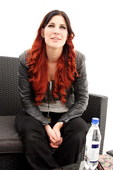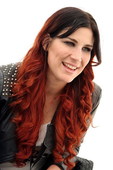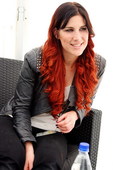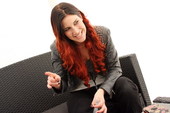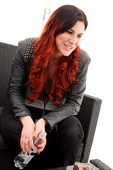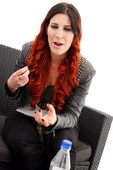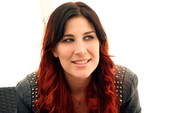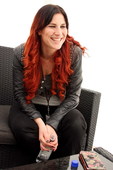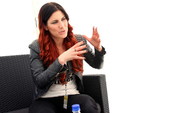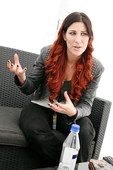Delain
Here Come The Others
30.07.2015
Архив интервью | Русская версияThis Dutch band has done a seemingly impossible thing – over the past few years they have elbowed their way to the cutting edge of female fronted sympho metal, a genre that’s severely overpopulated and, frankly speaking, not very broad. And their key success is not that their competitors have started slacking, it’s just that they’re so damn good at what they do. You can check out any of their records, if you haven’t done so, they are all high quality, but we would strongly suggest the latest two, “We Are The Others” (2012) and “The Human Contradiction” (2014), for some of the songs that are on there are really among the best their genre has had on over in the past few years. Or you can see them life if they are playing around you, which would be even better, for Delain are not yet tired of their touring routine and really enjoy the moments they have on stage. We managed to catch the band at this year’s Sweden Rock Festival, where they played at noon and still rocked like hell, and shortly afterwards we got together with singer Charlotte Wessels to discuss the life of a band that really knows how to enjoy their success and stay hungry.
You’ve visited Russia twice at this point. What are your impressions of the country and the audience?
We had a very good time last time we were in Russia, actually the time before that as well. Our experience has been very nice, we noticed that the fans are not only very much into the music, but there is more that that. I remember a very special moment the last time we played – we played our song “We Are The Others”, which speaks about, you know, the killing of Sophie Lancaster (21-year-old British girl killed by a teenage mob for wearing a goth outfit – ed.), and all the people had made signs saying, “I am Sophie”, and they were holding them up during the song. I completely choked up, I just got so emotional, it was really beautiful, especially with the message of the song, being, I can imagine, sometimes controversial, especially in Russia. I thought it was so beautiful that we had that moment. I didn’t expect it, but I was so happy that it happened.
In St. Petersburg, we had a good time too, I went to the Hermitage with some friends, we got a guide for tour, and it was really special. I’m very much into arts, and it was kind of hard to walk around it, when we only had like two hours. There’s so much to see!! You need a day or maybe two. So it was very nice, and we made some friends back then. I did have a hard time, because vodka is a real thing (everybody cracks), and we were having dinner before the show. The promoter and other people were like, “Whoah, here’s some vodka”, and we were like, “Sure! I’ll have another one! I’ll have another one!” (everybody laughs) And then it’s like, “You know, I’m playing a gig in a few minutes…” It was good fun.
Over the past few years you’ve toured relentlessly. Do you have a favorite concert or a favorite country to play? Or, let’s put it differently, what were your most unusual performing and traveling experiences so far?
The most unusual ones… I don’t really want to talk about it too much, but if you ask a question, I think I would have to talk about our bassist Otto (van der Oije), who got injured onstage… The word got out, people know about it. We did a tour in the UK last year, and we had confetti shooters, they are air-pressured, and they shot him straight in the nuts. He ruptured a testicle and he had to be rushed to a hospital – after the show. This is really manly, and this is the maddest part of the whole thing – he ruptured his testicle, they had to remove like ¾ of a liter of blood, and he finished the entire gig! This happened around the sixth song or something, and he finished the entire gig with a ruptured testicle. This was a very strange experience.
Even stranger was the experience when the word got out about what happened, and we got so much press interest - and not only from the press that usually interviews us and writes about us when we have a new album out. People who never spoke about us all of a sudden were like, “Hey, this and this happened”. I guess it was good publicity in a way, but it’s so sad that to get good publicity you have to experience something like that. I remember getting some messages, because I’m on the band’s Facebook, and after the incident I got some messages like, “Hey man, cool music, I’m a fan now, I know you from your bassist’s balls”. (everybody laughs) At least it got us some new fans.
I don’t really blame anyone for sharing the story. A lot of people were really cool about it, and they were mostly talking about how tough he was for standing it until the rest of the show, that was really cool. But there were some people who were joking about it after it had happened, and the thing is that you can have a lot of consequences. We didn’t know from the start that it was gonna be OK in the end. And then, I think, if you’re not part of the inner circle, I’m not sure if you can joke about this before you know it’s going to be alright. There are different sides of that story, but in the end, we don’t mind some extra publicity.
How do you manage to maintain such a tough touring schedule? It seems like you’ve been touring for a year by now…
Mainly by not being too rock’n’roll. When we started out, every tour I felt like every night I have to have a party, and every time there was somebody who was doing something fun, I thought I had to be there, because you don’t want to miss anything. But in the end when you play so much, it does become a bit of risk, and you don’t want to risk the cause why you’re there. In my case, I’m there to sing, so I cannot do anything that would put this at risk. Of course, you’ve got to live a little, so it’s not like I don’t have parties. But I do have to plan them a little. Some nights right after signing and meeting everyone I have to say, “I’m tired, I go to sleep right now”. It is boring, but for me the most important part of the day is when we are on that stage and when we’re connecting with the people who are listening, and this is the main priority for me that affects the rest of the things you get to do.
Do you write anything on the road? Do you already have any ideas for a new album?
We always say that we will, but it’s always complicated, because it gets quite busy, even though there’s a lot of waiting involved. I personally write best when I really have the time, when I have a day at home or at another place, and I can spend the day or the night doing that. When you’re on tour, it’s always like somebody needs you here for five minutes, and somebody else needs you there for five minutes… It’s a bit more complicated. Nevertheless, I can write lyrics and vocal lines, because for this you don’t need so much. I just need my notebook, I record all my ideas on my telephone so I don’t lose them, so for me it’s pretty easy to work like that. But when it comes to the next step, when it comes to any kind of arranging or wrapping parts together, it gets to be complicated. It’s easy to do things on your own island, so to speak, but it’s hard to work on songs as intensively as we do when we’re not on the road.
“The Human Contradiction” was a very strong record songwriting-wise and soundwise. Do you still think there is anything that can be improved on your next record?
We are already writing, we have some songs, and we have some ideas about the production. Martijn (Westerholt, keyboards) is actually going to produce again, just like he did with the previous record, and we had pretty good experiences with the mixing and the mastering, so chances are that we’re just going to go for the same kind of setup. As to the musical direction, I cannot say too much because there’s simply not enough material that’s carved in stone yet. But we’re pretty far in the process already, we’re on track, so to say.
There was an interview with the band which was made last year, and there somebody said a very interesting phrase about the song “Army Of Dolls”: “typical socio-critical Delain lyrics”. This is a very unusual thing to say for a sympho metal band or gothic metal band. Where does this social criticism come from? In our country many people believe that The Netherlands have exceptional living standards…
That’s an interesting question. I mean, nobody tells me in my daily life what I should wear or what I should look like, but if I go online, for example… A lot of the things we do in our career are very international, so we get judged by international standards. We also don’t really live in our Holland bubble, we tour, we see the world, and whatever you see affects you in a way. For example, when we wrote “We Are The Others”, the Sophie Lancaster story happened in the UK, and it wasn’t even on the news in The Netherlands, but it reached us through social media, through the scene that we’re in. Metal has never really been big-screened, we’ve always had our niches around the world, and I think if you’re talking about the metal scene in general, then you’re not talking about local or national scenes, but really about the international metal scene that is pretty much tied together. Look at the books that are performing on a festival like this – we all kind of know each other, we’ve all seen each other before, and I think the same goes for songwriting. When I write, I do not necessarily write so much about Dutch issues, but very much about international issues. And when it comes to a lot of topics, like “Army Of Dolls”, which pretty much about those weird beauty standards that people and women specifically are held up against – those you do find in Holland. When you talk about racism or sexism or heterosexism, those you find in Holland, too. The Dutch pride themselves on being very politically advanced, but if you look at The Netherlands, there are still a lot of issues where you’d think the contrary, in my opinion. I am very much aware of the privilege of the situation that I’m in, of living in The Netherlands, which is a great country with a great system, but still I think you should not stop being critical towards what happens around you… I think it’s always good to be sharp, to think about these things. I’m not even saying, “This is wrong” or “This is the solution”, but when I talk about issues in the songs, I guess, to people listening to them, it might be obvious what my position on them is. But I will never tell people what to think or what to do, I will just talk about the issues. (laughs) I cannot really stop it, I feel that if I didn’t talk about it, I would be like, “Oh well, what am I going to write about?” It really comes naturally.
How it’s been like working with Napalm Records? We know that you were not so happy with Roadrunner, how is it now for the band?
I have to make that more specific. We were very happy when we were with Roadrunner, we were unhappy when Roadrunner got sold to Warner Bros. Even then I wouldn’t want to bash Warner or anything, I mean, they bought a record label, and they were probably interested in some bands and less interested in others. But we were not in a position where we sat down at a table and said, “OK, we are going to sign with you”. They just got us with the rest of the bands that they got from Roadrunner. We came out of a very good situation where we were at with Roadrunner - we knew the people that we were working with, we really liked them, and they answered only to their internal director. When we were with Warner, we were still working with Roadrunner teams, but people were getting fired, and everybody was like, “Are we going to get fired next week, or do we keep our job?” The people who were working with Roadrunner had a lot of pressure on them, and they had to answer to another boss. It was a very different situation in the end than it was in the beginning, and I wouldn’t want to speak negatively about anyone that we worked with at Roadrunner. It’s just the situation after they got sold to Warner was just very different than the one we chose to sign.
Fortunately now we’re with Napalm Records. When we got out of that deal, we had a lot of offers which was really good for our egos, but we just had a very good feeling about Napalm, and it has remained positive throughout our working with them.
Apart from being busy with Delain, you also find time to participate in other projects. How did you get involved in the recording of Kamelot’s latest album, “Haven”?
We have toured with them for a couple of times now. Sometimes I did guest performances for them, so we’d already been working together in the live aspect of things. When we were touring with Sabaton in the beginning of this year, I got an email from Thomas (Youngblood, guitar), saying, “Hey, we’re doing this song, do you want to join in?” I was very happy and also honored to be asked to participate in their record, but it also was a bit of a challenge, because I was on tour. I was like, “Yes, sure, I’ll record it as soon as I come home”, and they were like, “Actually the deadline is before you come home…” So I had to record on the road. One of the good things about the international metal scene is that I could call some friends in different cities we were playing, and fortunately I got into a great studio in Athens, where I could record before our gig.
We heard that your cousin is a hardcore DJ (she performs as DaY-Mar – ed.), and you also do something together with her. Can you say a few words about this experience?
It’s already been quite some years since I collaborated with her. I sang on a song called “Embrace The Night”, which worked very well in that genre, I think. I also performed the song with her twice at Masters Of Hardcore, which is one of the biggest hardcore festivals around. It was really weird to be at such a different scene, but I’m not the one to think in boxes, so I went into it completely open. And the audience was very happily surprised, I mean, there’s mostly DJs, there’s not a lot of people performing on their instruments or vocals, I don’t want to say “live”, because, of course, there is a live aspect of what DJs are doing, too, but I think the people were really surprised to see a singer – (imitates an astonished voice) “Wow, a singer!!!” It was really cool, really interesting.
There was another project for which you contributed music: a movie series called “Queer Amsterdam”. We saw it announced in 2012, but we don’t know whether it was completed and aired anywhere…
The thing that happened is that I made the music for the pilot. As with any television series, the first thing that producers make is a pilot, which is the first episode, and then they use that to go around and try to get the entire series funded and get it on television. What happened is that there was a crowd-funding action to fund the pilot, and the pilot was completed, I made the music for it together with some friends, and it was actually in the biggest movie theater of Holland where it had its premiere. And it was completely sold out, it was absolutely amazing. The pilot is out, you can buy it online at queeramsterdam.nl, but they are still trying to get the entire series funded, they’re still trying to see if they can get it on television, this is an ongoing process. I’m really hoping that they get to do it, because if they do the entire series, I would also really like to make the music for the entire series, not just for the pilot. If the series is not released in a year or so, then maybe I will consider to take the songs and put them on a little EP or something. But with the prospective of me really hoping that they will get to make the entire series, I would like to first wait and see if that happens, because that would of course be more material.
We guess this music is quite different from what you do with Delain…
Yes, it is different. I work with a friend of mine, who does a lot of soundscapes, and it’s a lot mellower. When I write music for Delain, the music is the main part, you make the music that works autonomously. But when I was working for “Queer Amsterdam”, the music really had to support the visuals. One of the things that was a challenge with that was that there was a lot of dialogue and monologue in the series, and of course, when there is a lot of dialogue and monologue, and I start singing lyrics through that, it’s distracting. I’m very much used to writing my songs from the lyrics and from the melodies, but here I really had to take a step back and really direct it from another side, work with musical landscapes much more, work with moods and themes that kind of enlarge what is already happening in the film. I did really want to sing (laughs), so I had to choose the scenes that didn’t have monologue or dialogue in order to at least get my voice in there. It’s also because I thought that if people hear that I’m doing this, but not many people know that I write music, so they will not hear that I’m actually involved. So I thought, “I got to sing at least one song so that people will go, ‘Oh, it’s Charlotte’.” There are some songs with vocals, there are some soundscapes, and there are also some straightforward rock songs on there.
Delain, in turn, has had a very impressive guest list on your records. How do you get all these people like Burton C. Bell of Fear Factory to participate? Is it easy or difficult to reach them and get their consent? The music of Delain is pretty far away from what Fear Factory is doing…
They are usually the people that we met along the way and we had a connection with, either musically or personally or both. Usually the connection is already there. With Burton, for example, I met him at Wacken, and we had a good time there, and we stayed in touch afterwards. I was so excited when he wanted to do that song (“Where Is The Blood”, off “We Are The Others” CD – ed.) because it’s such a perfect fit. He also has some projects which are also different from Fear Factory. It’s always very exciting to get guests onboard, and with the people we have worked with so far it has never been a real problem, they’ve always been excited to cooperate rather than they had to be pulled in. (laughs)
We guess the problem is to reproduce their parts live afterwards. For example, today you didn’t play “Sing To Me” (which features Marco Hietala of Nightwish in the studio version– ed.)
No, we can do that. Usually before when we have guest performers sing, we sing it ourselves on the demo, either myself or… Well, I used to need somebody else for grunts, but now I can do grunts as well. Usually whatever we do, I can take it over, or Otto or Timo (Somers, guitar) can take it over.
Our next question seems pretty obvious, but still: how did you get the vocal spot with Delain? It is written everywhere that you studied jazz in a music school for several years, but did you sing in any rock or metal bands before joining Delain, or was this music totally new to you?
I get a lot of questions about this, I think I have to change my bio. I didn’t go to a conservatory, I just took music lessons as a kid, and at the music institution where I was getting my lessons, you could take either classical or jazz lessons. But the only reason why it’s called jazz is that it’s a really classical institution, a really traditional one, and those were the only courses they had. If you wanted to do classical, you went to classical, and if you wanted to do anything that is not classical, then you went to jazz, so jazz could be anything from pop to rock. Actually that is not the thing that got me into metal. When I started with that, I went to take classical lessons, and then I did very high-pitched stuff. This was actually in the heyday of “the beauty and the beast”, high soprano vs. low grunts. This was when I did a few performances of classical singing. And then I got into some local bands, because there always guys who were like, “Oh, there’s a girl who can sing high, we need to form a metal band”. Actually through one of these projects I met Martijn, he was working on songs for Delain, and he asked me to contribute. That’s how it happened.
In your opinion, why are there so many talented female singers with great voices coming out of The Netherlands– Anneke Van Giersbergen, Sharon Den Adel, Floor Jansen, etc? Are kids taught classical and pop singing in regular schools, or does the government support young talents, or maybe there is anything else?
When I was starting to go to gigs, the bands that were playing around me were After Forever, The Gathering, Within Temptation, so for me and for the bands that started a little bit later than that, it is actually very logical, that is your natural influence when you grow up. Of course, the question remains: those first few – where does that come from? I don’t really know. Actually I was speaking to Marcela (Bovio) of Stream Of Passion, and she said, “When I moved to The Netherlands from Mexico, the weather and the gloominess of The Netherlands really affected me”. Maybe it’s the weather, you know (laughs), maybe we get inclined to sing this type of music that is going into these darker edges. For me, I just really feel that the bands that are playing around you directly influence your experiences, and in my case, it’s easy to get inspired, because you actually see women doing this. The things that you see on television are always kind of far away, you always think, “I couldn’t aim for that” or something, but when it’s in your country, when it’s on your local stage, and you see those people performing, it’s a really different thing.
As far as we understand, you are not afraid of experimenting, you like new experiences. Are there any things in music or in life that you still want to try?
Oh yes, so many things. I’ve just turned 28 years old, I’m not done, there’s lot of things that I want to experience, there’s a lot more music that I want to write, there’s a lot more stages that I want to play. And on a personal level, I’ve got a long life to live, to love and to enjoy music and art and books and the earth if we don’t ruin it before I die.
Delain on the Internet: http://www.delain.nl
Special thanks to Mona Miluski (Napalm Records) for arranging this interview
Interview by Roman Patrashov, Natalie “Snakeheart” Patrashova
Photos by Natalie “Snakeheart” Patrashova
June 4, 2015
© HeadBanger.ru
